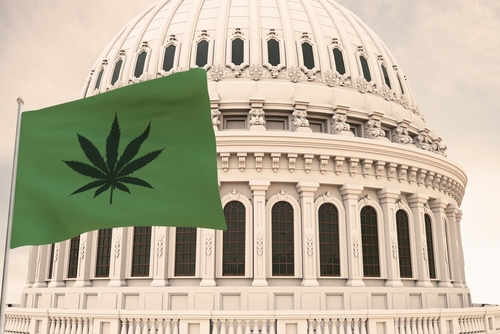U.S. Senate Majority Leader Chuck Schumer (D-NY) on Thursday joined U.S. Sens. Cory Booker (D-NJ) and U.S. Senate Finance Committee Chairman Ron Wyden (D-OR) in introducing legislation to federally decriminalize marijuana.

The Cannabis Administration and Opportunity Act also would permit states to set their own marijuana laws without fear of punishment from the federal government.
During a speech on the U.S. Senate floor today, Schumer said he’s committed to working in a bipartisan way to get cannabis reform passed by Congress this year.
“It is time that Congress catches up with the rest of the country,” Schumer said on the Senate floor. “This bill provides the best framework for updating our cannabis laws and reversing decades of harm inflicted by the war on drugs.”
If enacted, the measure — which includes priorities from both Democrats and Republicans — also would deschedule cannabis, “provide for reinvestment in certain persons adversely impacted by the War on Drugs,” and expunge certain cannabis offenses, according to the text of the almost 300-page bill.
The Cannabis Administration and Opportunity Act also would create grant programs for small business owners in communities disproportionately harmed by previous federal drug laws who want to get into the growing industry, the text says, noting that legal cannabis sales in 2021 totaled $25 billion and are projected to reach $45 billion by 2025.
“The communities that have been most harmed by cannabis prohibition are benefitting the least from the legal marijuana marketplace,” states the bill, which adds that enforcing cannabis prohibition laws costs U.S. taxpayers roughly $3.6 billion a year, according to the American Civil Liberties Union.
“A legacy of racial and ethnic injustices, compounded by the disproportionate collateral consequences of 80 years of cannabis prohibition enforcement, now limits participation in the industry,” the bill says. “Federal law severely limits access to loans and capital for cannabis businesses, disproportionately impacting minority and tribal small business owners.”
Additionally, the proposal also would restrict the marketing of cannabis to minors, and would make awards to prevent underage cannabis use and set up national media campaigns on cannabis use.
At the same time, the bill also would authorize and establish federal funding for law enforcement departments to fight the illegal cultivation of weed.
Among numerous other provisions, the U.S. Department of Transportation (DOT) would be tasked with conducting R&D for a nationwide marijuana-impaired driving standard, and developing DOT cannabis-impaired driving prevention programs.
There are also provisions related to workplace health and safety; banking, housing and community development; public health; taxation; and trade, among others.
Booker, who is chairman of the U.S. Senate Judiciary Subcommittee on Criminal Justice and Counterterrorism, has scheduled a July 26 hearing entitled, “Decriminalizing Cannabis at the Federal Level: Necessary Steps to Address Past Harms.” He suggested earlier this week that the newly proposed bill will be included on the agenda.
Schumer, Booker, and Wyden in July 2021 released a draft version of the Cannabis Administration and Opportunity Act, which retains the draft’s main provisions but was expanded with feedback from stakeholders, advocates and other lawmakers, according to the senators.
“Underlying it all, this bill is about individual freedom and basic fairness,” said Schumer earlier today in his speech. “The fact that cannabis remains a Schedule I controlled substance — in the same bad company of other drugs like heroin — it’s not just senseless, it’s deeply harmful for countless Americans. It impinges on the freedom of all of us. If this is working in all the states, why not let people use it?”
Andrew Freedman, executive director of the Coalition for Cannabis Policy, Education, and Regulation (CPEAR), said, “This bill represents a pivotal moment for the cannabis industry and is an opportunity to create a responsible federal cannabis regulatory framework rooted in science, evidence, and data.”
“It is essential that federal legislation provides strong guardrails to prevent youth access and drugged driving through the inclusion of strong public health and safety standards,” Freedman added.
Earlier this year, CPEAR released polling showing 70 percent of voters support federal cannabis reform to end the federal prohibition on cannabis for adult-use. Additionally, 67 percent of voters nationwide support ending prohibition at the federal level and allowing individual states to decide whether cannabis will be legal in their state.